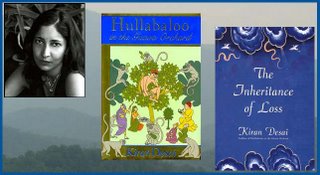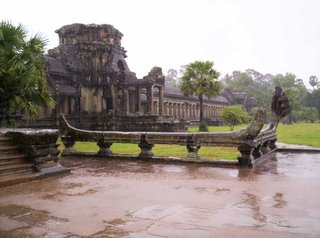little arsonist
"just say yes, you little arsonist. you're so sure you can save every hair on my chest. just say yes..."
Friday, October 27, 2006
from cambodia: genocide

the street leading to the tuol sleng genocide museum in phnom penh is quiet. inside lies proof of a past too horrific to forget. outside, crippled men stand in shadow, hoping for charity. the photographs inside stand untouched, except for one of pol pot, scarred by a sharp object. anger doesn't just fade away.
from cambodia: the dreaming spires

the rain pours. 9 am on a monday morning, and the temples of angkor refuse to yield their secrets. what, i wonder, could king suryavarman ii have been thinking when he first came up with his grand plan eight centuries ago? would he have liked having me -- camera in hand, khaki-clad -- wander down passages reserved for kings?
Thursday, October 19, 2006
a kind of inheritance

who your mother is makes a big difference to the way the world looks at you. kiran desai, who was born to author anita desai 34 years ago, knows the feeling. what she chose to do in life would, possibly, not attract as much attention if she were to have picked a different profession. what kiran wanted, however, was to write. and journalists of indian origin the world over sat up to take notice.
1998's hullabaloo in the guava orchard arrived with much promise. much was made of kiran desai's prose, and the fact that here was a writer with tremendous potential. and then, she disappeared. took the next seven years off, to resurface earlier this year with the inheritance of loss.
four years to write her first novel; seven for her second. it seems like a tremendous amount of time, until you begin to read it. that's when the care lavished on each of those sentences manifests itself. from descriptions of the landscape in the shadow of mount kanchenjunga, to the tenuous relations between different races in the cultural melting pot that is new york city -– desai chips away slowly, calmly, fashioning each character and chapter unhurriedly.
it is a commendable virtue any novelist ought to cultivate – patience.
what i took away from my reading of the inheritance of loss was a sense of despondency. a quiet melancholy about the lives we live. strangely, it was the kind of sadness i found an echo of in john banville's the sea, where he writes of the human condition: 'what a little vessel of sadness we are, sailing in this muffled silence through the autumn dark.'
this is a novel of memorable characters. the ageing, bitter judge who wants to forget his past but is betrayed at every step by a mind that refuses to forget. his granddaughter, the orphaned sai, who turns up as a child and grows up to fall in love with her nepali tutor. their cook, whose son biju in the us leads a life radically different from the picture of hope his father has painted for himself. it is events, in kalimpong and america, that shake these people out of their carefully constructed lives and lies to reveal truths that each of us, in our own particular stories, have access to.
the title of the book, then, is apt. it speaks off little failures, in a way, passed down from generation to generation. the failure to hold on to the purity of childhood, perhaps, or to maintain a sense of innocence in the face of brutal life, or the ability to hope knocked down bit by tiny bit, daily.
ultimately, the inheritance of loss is an impressive novel. and, in parts, a funny one. when i got in touch with kiran desai, then, it was with questions related to its making, as well as questions about the issues that appear to drive her writing. even her replies held little stories. here is a little of what she had to say...
you were born in india and educated here, in england and the united states. considering your formative years were spent abroad though, is there any particular reason both your books are set in india?
i left india when i was 15, but i have immediate family in delhi and return every year to the family home, so the connection was never broken. i think my first book was filled with all that i loved most about india and knew i was in the inevitable process of losing. it was also very much a book that came from the happiness of realising how much i loved to write. the second book isn't a book that is set entirely in india, but one that tries to capture what it means to live between east and west and what it means to be an immigrant.
on a deeper level, it explores what happens when a western element is introduced into a country that is not of the west, which is what happened, of course, during colonial times and is happening again with india's new relationship with the states.
i also wanted to write about what happens when you take people from a poor country and place them in a wealthy one. how does the imbalance between these two worlds change a person's thinking and feeling? how do these changes manifest themselves in a personal sphere, a political sphere, over time? these are old themes that continue to be relevant in today's world, the past informing the present, the present revealing the past.
i haven't been to kalimpong or darjeeling, but your descriptions of both places came across as extremely authentic. did you actually visit them? also, with reference to the nepali insurgence, what sort of research did that part of the book involve?
there is a parallel between the stories of nepali immigrants in india and indian immigrants in the states, all struggling with questions of what it means to be the cheap labour, with the questions of rights and identity.
the political information is accurate to my knowledge and based on my memories and the stories of everyone i know there. also, the details are accurate: gobbo the town thief with a relative in the police, the two old cobras living in the jhora ravine, a pair of afghan princesses, a swiss priest who ran a cheese making enterprise. i remember him with great affection along with the lovely sweet yoghurt and the chocolate cigars he sold from the dairy.
while writing this book, i wrote all the kalimpong bits in kalimpong, staying in a house lent to me during the rainy season. it was very wild and beautiful, rain hammering down, mist and fog. i lived alone and learned both the hard and the beautiful way what it means to be a writer.
you manage to raise pertinent questions related to the immigrant issue. the overwhelming tone that comes across is one of bitterness though, felt by most immigrants who leave their home country. would you agree with that?
i think there's always a degree of loss in being an immigrant. it feels as if one will never be able to tell an entire story ever again. there'll be an aspect of living half a life, having only half a story to tell. we tend to hope for a simplicity of truth, a wholeness which is rarely delivered us.
my book examines lives that are forced, because of circumstance, to be those of hypocrisy, of gaps and fears, or of truths that cannot be simply attained and added up into anything trustworthy. they conflict with other peoples' ideas of things, or they belong to times past and stories that are lost or forgotten.
people deal with situations like this differently. i've seen a lot of insistence on being as american as possible, which i think is something that often comes out of a sense of shame. i've seen a lot of cruelty in the process of leaving and breaking families apart. what frightens me most, though, is that while there's a lot of crowing about how we're the richest minority group, we tend to leave out the fact that the poorest people of india are also in the states, betrayed not only by the western world, but by the wealthier group of indian immigrants.
the divide that exists in india continues overseas. it is to the advantage of everyone on the more powerful side. there's never been an honest attempt in the united states to address the problem of illegal immigration. it suits them to have an underclass as much as it suits wealthier people in india to have a servant class.
there is a certain sympathy in your tone when you describe the desperation experienced by biju and thousands like him as they stand in line for a visa. what inspired you to come up with that particular aspect of the novel? have you spoken to people like biju in the u.s.?
i have stood in line myself at the american embassy many times over and witnessed the scene unfold. i think poverty is so extremely close to us that it's practically the closest thing in our lives although sometimes we refuse to see it.
it's every bite of food we eat that's been picked by someone poverty stricken and every item of clothing we wear. i've seen the efforts made on the indian side to leave india, i get requests for help in this matter every time i return. and in the states, in every restaurant and shop, in taxis all over manhattan, i've heard the story on the other side.
i used to live near a bakery like the queen of tarts (a restaurant mentioned in her novel) and talked to the people who worked there. and i lived with people from zanzibar in the neighbourhood that i describe, so that is also taken from real life.
as a writer, are you satisfied with the way your work has developed?
i think this book is better than the last, but certainly i don't think it's perfect. it's the hardest thing to write a perfect book. yet, of course, as a reader, i hunger for it. it's a constant desire and i know i'll write another book for that reason. each book is its own challenge and i find myself at exactly the same level of trepidation and doubt as when i began the last time around.
writing, for me, means humility. it's a process that involves fear and doubt, especially if you're writing honestly. i imagine businessmen feel smug at least twice a day. writers? the moments are rare.



